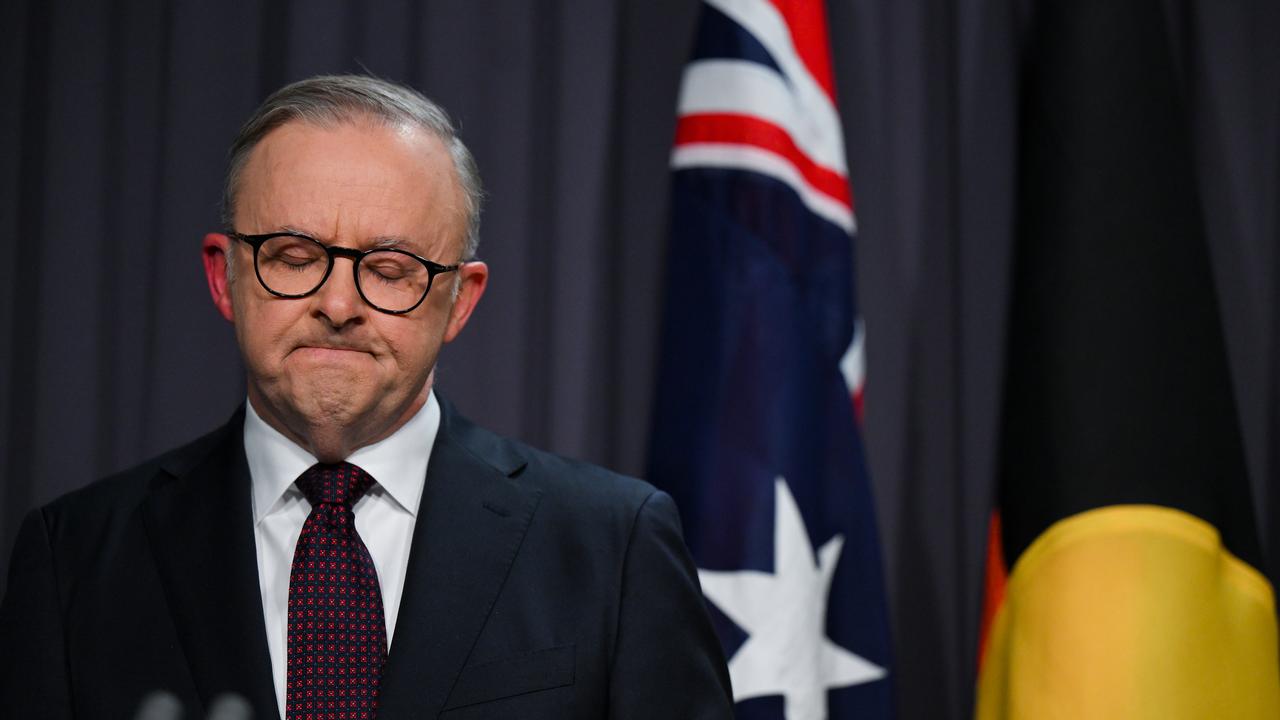A chorus of chagrin greeted news of a ‘No’ vote at Saturday’s The Voice referendum. But the damage for Australia – especially in our own Asia-Pacific region – could go further than a bruised reputation. Andrew Gardiner reports.
Just as Australians couldn’t quite comprehend Brexit, or the election of Donald Trump, it seems foreigners can’t get their heads around why we said ‘No’ to the Voice.
America’s newspaper of record, the New York Times, captured the global sense of bewilderment and let-down last night: Australians had “crushed indigenous hopes” that the country was finally “taking a step to do right by them after centuries of abuse and neglect.”
Times reporter Yan Zhuang referred to “unrealistic fears” whipped up by the ‘No’ campaign, “like of homeowners being forced to return their land to Indigenous people.” Without spelling it out, such words implied Australians who rejected the Voice were ignorant and prejudiced.
“The Voice was conceived by Indigenous leaders to address entrenched and growing disadvantage in their communities. Life expectancy for Aboriginal people is eight years below the general population, while rates of suicide and incarceration are far higher than the national average,” Zhuang wrote.
Our rejection of what foreigners see as a clearly desirable solution to these problems is a head scratcher in both the US and the UK, where Oxford scholar and GP Dr Isabel Hanson – a Voice supporter who works in First Nations health in remote parts of Australia when at home – told MWM that “nobody here understands why people would vote ‘No’ to this”.
“It’s imperative that we keep trying for an advisory body like the Voice, perhaps via legislative means. We can’t let this (result) get us down,” she said.
Setback, says Singapore
Closer to home, another newspaper of record, Singapore’s Straits Times, said the ‘No’ vote would be “a setback to reconciliation efforts with indigenous Australians” and has exposed “division and raised allegations of racism.” The Times is a reliable gauge of opinion within that country’s government.
In comments published by the New Zealand Herald once the referendum result was known, a Papua New Guinean academic said the ‘No’ vote would be a setback for Australia’s country-to-country and people-to-people relations in the Pacific.
Dr Bal Kama of the University of Canberra, said people in Australia needed to have made a decision that could ensure we are seen in the Pacific “as a society that embraces, hears out (and) gives opportunity” to its indigenous population. “Because treating them right (in Australia) would send a message that they can also be treating the Pacific right.”
Australia stands alone – ‘a bad faith braggart on human rights’
Meanwhile, Pacific leaders have voiced a keen interest in the outcome of the vote, saying it would have an impact on how Australia is viewed as a country in the region, Radio New Zealand reported.
People in the Asia-Pacific will see Saturday’s “No” vote, and the AUKUS agreement (right) as proof Australia stands aloof from the region, a bad faith braggart on human rights. Images: Fair Australia, UK Government.
Boiled down to its essence, the international reaction to Australia’s emphatic ‘No’ at Saturday’s Voice referendum was disquieted in word, and – potentially, for us – disquieting in deed. Unfairly or not, we’ve been lumped in with the UK (Brexit) and US (Trump) as countries prepared to shoot themselves in the reputational foot to hang on to what’s seen as a chequered past.
“Still stuck in its colonial past”
Our international standing could be hit hardest in the Asia-Pacific region, one senior figure from a Pacific neighbour telling MWM a “no” would confirm to doubters in this part of the world that Australia is “still stuck in its colonial past, and is too cold hearted and closed-minded to address the abuses and injustices of that past.”
Speaking immediately prior to the Voice referendum, prominent Vanuatu opposition MP Ralph Regenvanu, went further, telling the ABC a ‘No’ vote was “almost inconceivable, fills us with dread” and would be a “blow to our relationship” at a time when other Pacific nations, including the Solomon Islands, have a growing dependency on China.
Professor Rhonda Evans, director of Australian and New Zealand Studies at the University of Texas (Austin) pointed out that direct relations with China, our largest trading partner, would be even more fraught as a result of the ‘No’ vote. “The Albanese Government has been trying to repair relations (with China) but this will set those efforts way back,” Evans told MWM.
Given the latter’s sensitivity over its treatment of indigenous Uyghurs, and Indonesia’s raw nerve over Melanesians in West Papua, observers believe it’s entirely likely both will seize on the ‘No’ vote to ask ‘what about Australia?’As a result, they say relations with the broader region will suffer.
Wrong direction – with AUKUS
In the Asia-Pacific region, a ‘No’ vote is seen as yet another case of Australia clinging to its White Anglo Saxon past and remaining aloof from its neighbours. Evans quoted former Prime Minister Paul Keating: our security needs to be “in Asia,” not “from Asia.”
Flying in the face of this guidance, we’ve instead joined the AUKUS alliance – ushered in amid concerted attacks on China – and preserved other imperial links which alienate the region.
If Australia wants developing nations to aspire to be more like it, experts say we need to seriously address our own internal injustices. “A ‘No’ vote from Australia call(s) into question the authenticity of its words and actions abroad at a time when authoritarian regimes present themselves as (an alternative path),” analyst Ambika Vishwanath wrote in The Interpreter.
Trade and geo-political implications alone add a real-world dimension to what is much more than reputational damage.
I’m not racist, but …
“I’m not a racist, but …” Observers say variations of this phrase, uttered regularly over the years by Pauline Hanson (above left) were a stumbling block to a ‘Yes’ vote, skilfully exploited by Peter Dutton (right). Image: ABC, News Corp.
Just as Kevin Rudd’s Apology was reduced to soundbites, defined as “progress” and awarded praise by global media always chasing binary “good v bad,” our ‘No’ vote on the Voice will be ripped as retrograde, and Australia as “the same old place ”that brought us “two Wongs don’t make a White.”
Our former ambassador to the US and several Asian countries, John McCarthy, concedes this fails to account for some of the complexities of Australian culture and society, but insists the threat to Australia’s interests is no less real.
While White Australia was long ago consigned to history, its echoes linger across the Asia-Pacific, re-awoken by race baiting from Voice antagonists during the Voice campaign. “Australia Indigenous referendum hit by ‘toxic’ disinformation, ”read one South Asian headline – for ‘toxic’ read racist, a trait seen across the region as lurking just beneath our multi-cultural façade.
Elementary critiques aside, is racism at the heart of the ‘No’ vote? It’s complicated.
Earlier this month, a group of 70 law academics described the Voice proposal – for a new advisory body comprised of First Nations (FN) people, which would give its opinion on matters affecting FN Australians but hold no veto power – as innocuous by any objective standards. It was not dissimilar to a Norwegian constitutional amendment earlier this year, which recognised the Sámi people as indigenous to Norway and added formality (again, without veto power) to the input of a Sámi parliament.
Why did The Voice Yes vote fail?
This was not put to a referendum, but equally, it was not controversial, was passed overwhelmingly and has been warmly accepted by the Norwegian public. So too were indigenous advisory bodies in Canada and Taiwan.
Why, in contrast, did the Australian Voice fail?
The answer appears to lie in a term more commonly found in Australia than Norway: former Race Discrimination Commissioner, Graeme Innes, called this loaded phrase ‘I’m not a racist, but …’.
”Innes and others believe these five words allowed many Australians to hide visceral fears of FN people behind largely meritless constitutional concerns (“it’s a third chamber of Parliament!”) in voting ‘No’, or, worse, to subtly label FN Australians lazy or anti-social while expressing ‘concern’about their disproportionate numbers in welfare dependency or the justice system.
Commonly known as dog whistling, it appears one need not even assign pejoratives like “lazy” or “anti-social”if they’re ingrained in a nation’s zeitgeist. Thus, on flying visits to Alice Springs in January and April, we saw Opposition Leader Peter Dutton merely speakof crime and widespread child sexual abuse among FN communities in the Northern Territory, exuding compassion and mindful not to assign blame, in a speech which marked the start of his campaign against the Voice.
Morning radio, News Corp dog whistling
Clearly, there is a market in Australia for such re-packaged racial controversy. In and around Dutton’s visits, racial outrage was the flavour of the month on morning talk radio and in News Corp outlets, two reliable conduits for amplifying a dog whistle.
Days later, self-described “Jewish Nazi” and internet provocateur Avi Yemeni descended upon the red centre to interrogate the “gangs terrorising Alice Springs.” More than a dog whistle, the emotion generated by Dutton’s itinerary suggests racial tags are sufficiently ingrained in this nation’s zeitgeist for speeches such as his to be deemed, by the local police minister, “a dog act.”

Land of contrasts: 76 per cent of respondents to a survey for the ABC agreed there’s a lot or racism in Australia these days, but just 46 per cent said white supremacy is ingrained here. Images: ABC.
Certainly, most Australians concede there’s racism here: in a 2021 survey for the ABC, 76 per cent of respondents agreed racial prejudice persists here to this day. But again, it’s complicated: just 46 per cent of ABC survey respondents agreed with the more challenging idea that we have a systemic problem; namely, “that white supremacy is ingrained in our society.”
Many Australians seem touchy and tough to nail down on the issue of racism. But actions speak louder than the words uttered to an ABC pollster, and as historians point out, this nation’s deeds since colonisation leave a lot to be desired.
Over the past 10 years alone, Amnesty International reports that racist incidents are rife in practically all aspects of Australian society, from public transport, to schools and healthcare facilities. This was publicly punctuated by the persistent abuse of Sydney Swans star Adam Goodes throughout the 2015 AFL season, for the “crime” of speaking up for his people.
The scathing foreign response to Australia’s “no” vote on Saturday may have lacked nuance, but they could be onto something. It appears many non-Indigenous Australians do have a racism problem, can’t deal with being challenged on that and – like the psychiatric patient who won’t accept s/he has a problem – have little interest in changing their ways or better-harmonising with First Nations people, much less our Asia-Pacific neighbours.
The consequences could be dire. “Reputation counts,” McCarthy wrote, explaining that “nations with internal divisions are generally seen as less reliable partners … than those without significant social and economic fissures.”
An Adelaide-based graduate in Media Studies, with a Masters in Social Policy, I was an editor who covered current affairs, local government and sports for various publications before deciding on a change-of-vocation in 2002.



